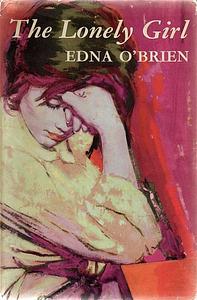Take a photo of a barcode or cover
As humorous as the first, but increasingly starts to feel almost like a kind of survival mechanism: we can only laugh to ward off the crying. I think I'd forgotten since first reading it just how dark The Country Girls can get along the way; this sequel sees no issue with pushing ever further. It is not always easy to read, but near impossible to resist: these are intoxicating characters.
dark
emotional
hopeful
lighthearted
reflective
relaxing
slow-paced
Plot or Character Driven:
Character
Strong character development:
Yes
Loveable characters:
Yes
Diverse cast of characters:
No
Flaws of characters a main focus:
Yes
Really enjoyed this second part of the trilogy. The characters were relatable and interesting and I found it sad and funny in equal measure. Great.
emotional
tense
medium-paced
Plot or Character Driven:
Character
Strong character development:
Complicated
Loveable characters:
Complicated
Diverse cast of characters:
No
Flaws of characters a main focus:
Yes
challenging
emotional
sad
slow-paced
Plot or Character Driven:
Character
Strong character development:
Complicated
Loveable characters:
No
Diverse cast of characters:
No
Flaws of characters a main focus:
Complicated
This was the only decent-sounding novel I found on the shelf of our vacation rental in Edinburgh. I'd never heard of the trilogy and didn't know anything about it before picking it up. It's the kind of story that always makes me feel down and miserable and man-hating, but it was a really interesting period piece and the prose was simple but very vivid.
emotional
reflective
tense
slow-paced
Plot or Character Driven:
Character
Strong character development:
Yes
Loveable characters:
Yes
Diverse cast of characters:
No
Flaws of characters a main focus:
Yes
This is one of the 1001 Books we're all supposed to read, but must confess this is another "why, exactly?" for me. It was likeable but not much more. I read O'Brien's "House of Splendid Isolation" a few years ago & liked it a lot more. I think I just don't like "good girls" in literature! The best part of this book was when shy, insecure Kate escapes from her father's house. If you really like books set in Ireland, you'll probably enjoy this - it's probably a fairly authentic period piece - otherwise, maybe not.
The continuing adventures of Caithleen and Baba, two country Irish girls negotiating their way through life in Dublin and getting to grips with womanhood. Baba takes something of a side step in this book as it's much more about Caithleen's experiences. And because of this, although Baba is still very much Baba, I didn't feel the full hit of her awfulness as I did in the first book.
Caithleen, still uncertain and full of romantic ideals, meets a guy in his thirties - an absolute nightmare for a Catholic. He is a protestant, a divorcee (it's coming) with a child with the ex-wife. What a disaster. And his father was a foreigner. It's a tough start for a potential relationship. Especially when Caithleen is only just 20, incredibly naive and insecure and hasn't really figured out who she is yet. Still, they get involved, and after an anonymous letter is sent to her father telling him about the kind of man Eugene is (including a few lies such as that he's giving Caithleen dope), the drunkard father comes to Dublin to "rescue" his daughter and take her home. She escapes, so he gathers a drunken, biogoted mob to come and deal with the couple. It's really horrific just how narrow minded and controlling people are in this book. Caithleen's situation is an utter disgrace in the village, but the fact that her father is a drunkard who hit his wife and child, drank away every penny they had, including the ownership of the farm... well, that's dismissed out of hand as nothing, the priest commenting at one point that it's just the climate.
Despite the lynch mob and the world being against them, they struggle through, but in the end it is themselves that can't get the relationship through. Caithleen is too young, naive and uncertain of herself for Eugene. She's aware of this and it comes out in silly emotional outbursts, which would annoy anyone. Yet Eugene makes matters worse to an extent, patronising her all the time and trying to educate her to his way of thinking. Because of course the best way to help someone with problems and insecurities is to make them feel even smaller. This is one of the things that makes me cross whilst reading these books and wanting to read on, the fact that everyone, through whatever intention, is trying to control and mould Caithleen. She never gets a chance to grow herself. So we end up with this silly sobbing mess. There's some hope as she and her friend Baba set sail for England at the end of the book.
Baba is still selfish and when she makes an appearance she still has some wonderful cutting barbs, but as I said she's taking a bit of a back seat in this book. It makes her less hateful. I really couldn't stand her in the first book. You could think she is a friend. There's one thing that was never explained in the book: who wrote those anonymous letters? I suppose it was always going to come out one way or another, but I suspect it was Baba behind those letters. There were silly embellishments to Caithleen's apparant shame; plus she sent a little warning letter to Caithleen. In the first book she was always sabotaging the girl and wanting to appear the better, so I don't suppose it went down well that a man they both knew was more interested in Caithleen. I wonder if we'll find out the truth in the third book.
Caithleen, still uncertain and full of romantic ideals, meets a guy in his thirties - an absolute nightmare for a Catholic. He is a protestant, a divorcee (it's coming) with a child with the ex-wife. What a disaster. And his father was a foreigner. It's a tough start for a potential relationship. Especially when Caithleen is only just 20, incredibly naive and insecure and hasn't really figured out who she is yet. Still, they get involved, and after an anonymous letter is sent to her father telling him about the kind of man Eugene is (including a few lies such as that he's giving Caithleen dope), the drunkard father comes to Dublin to "rescue" his daughter and take her home. She escapes, so he gathers a drunken, biogoted mob to come and deal with the couple. It's really horrific just how narrow minded and controlling people are in this book. Caithleen's situation is an utter disgrace in the village, but the fact that her father is a drunkard who hit his wife and child, drank away every penny they had, including the ownership of the farm... well, that's dismissed out of hand as nothing, the priest commenting at one point that it's just the climate.
Despite the lynch mob and the world being against them, they struggle through, but in the end it is themselves that can't get the relationship through. Caithleen is too young, naive and uncertain of herself for Eugene. She's aware of this and it comes out in silly emotional outbursts, which would annoy anyone. Yet Eugene makes matters worse to an extent, patronising her all the time and trying to educate her to his way of thinking. Because of course the best way to help someone with problems and insecurities is to make them feel even smaller. This is one of the things that makes me cross whilst reading these books and wanting to read on, the fact that everyone, through whatever intention, is trying to control and mould Caithleen. She never gets a chance to grow herself. So we end up with this silly sobbing mess. There's some hope as she and her friend Baba set sail for England at the end of the book.
Baba is still selfish and when she makes an appearance she still has some wonderful cutting barbs, but as I said she's taking a bit of a back seat in this book. It makes her less hateful. I really couldn't stand her in the first book. You could think she is a friend. There's one thing that was never explained in the book: who wrote those anonymous letters? I suppose it was always going to come out one way or another, but I suspect it was Baba behind those letters. There were silly embellishments to Caithleen's apparant shame; plus she sent a little warning letter to Caithleen. In the first book she was always sabotaging the girl and wanting to appear the better, so I don't suppose it went down well that a man they both knew was more interested in Caithleen. I wonder if we'll find out the truth in the third book.
dark
emotional
reflective
sad
medium-paced
Plot or Character Driven:
A mix
Strong character development:
No
Loveable characters:
No
Diverse cast of characters:
No
Flaws of characters a main focus:
Yes
Graphic: Alcoholism, Miscarriage, Sexual content, Toxic relationship, Pregnancy, Alcohol







